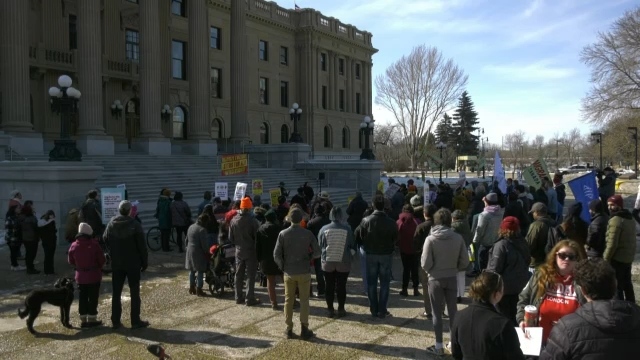This petition asks Canada to grant asylum to transgender people from the U.S. Could it work?
Activist says trans, non-binary people considering seeking
refuge amid rising tide of anti-LGBTQ bills
Tens of thousands of Canadians are joining a call for the Canadian government to help transgender and non-binary people fearing the outcome of anti-LGBTQ legislation gaining ground in the United States and other countries.
Cait Glasson, an activist in Waterloo, Ont., launched an online petition to the House of Commons, asking the federal government to extend the right to claim asylum "by reason of eliminationist laws in their home countries, whatever country that may be."
She said friends in the U.S. are already preparing for the possibility that they will have no choice but to leave the country.
"I know a lot of people who are getting their passports updated, making sure their ID is up to date," Glasson said in an interview with CBC Radio's Day 6.
"They're making plans to be able to move fast if they need to. And that, I think, scares me more than anything."
Laws and bills targeting LGBTQ rights at the state level in the U.S. have already reached record numbers in 2023. The American Civil Liberties Union (ACLU) is tracking more than 400 anti-LGBTQ bills across the country, including restrictions on accessing gender-affirming health-care services, criminalizing transgender people's use of public bathrooms and bans on minors at drag performances.
Other bills aim to ban books about sexual orientation and gender diversity in libraries, or limit the use of chosen pronouns in schools. The ACLU warns years of progress is at risk of being undone.
"Over the course of the last few years, we have seen a race to the bottom in state houses across the country attempting to restrict trans people across nearly every area of our life," said Gillian Branstetter, a communications strategist for the ACLU.
"I think, taken as a whole, it is an effort to undo much of the legal progress that trans people have made, not just in the last decade, but in the last decades, and further entrench a very rigid and archaic understanding of gender."
Demand for action
Glasson's petition has garnered more than 135,000 signatures since it was started on Jan. 26 — the third highest number of signatures, behind two petitions regarding firearms legislation, since the federal government initiated e-petitions in 2015.
Mike Morrice, the Green Party MP for Ontario's Kitchener Centre, authorized the e-petition and will present it to Parliament once it closes. He said he's surprised at how much attention it has received but that it speaks to Canadians having a "sense of wanting to be a safe haven."
He told CBC News the petition is a means of pressing the federal government to recognize what's happening with anti-transgender and anti-LGBTQ legislation in the U.S. and other countries. He wants the government to ensure there is a means for transgender and non-binary people to seek refuge, if needed — especially young people from states limiting gender-affirming care.
Morrice acknowledges Canada has a history of welcoming people from around the world, fleeing persecution based on their sexual orientation or gender identity, and that citizens of the U.S and the U.K. can claim asylum here.
But even though American and British citizens are able to travel to Canada visa-free, unlike people fleeing a number of countries with repressive anti-LGBTQ laws, it's not as easy for them to successfully apply for protection.
"[The U.S. and U.K. are] deemed to be safe countries," Aleks Dughman Manzur, director of programming and advocacy at Rainbow Refugee in Vancouver, told CBC Radio's The Early Edition last week.
He said there is a high threshold to prove "a well-founded fear of persecution." Anyone seeking asylum would also have to prove they are "facing an imminent risk or cumulative amount of discrimination" and cannot seek safety within their home country, he said.
Some Democrat-led states are taking steps to protect transgender and non-binary people, especially young people. This month, for example, Minnesota Gov.Tim Walz signed an executive order to protect the rights of LGBTQ people in the state. A bill tabled by Minnesota's first openly transgender lawmaker also aims to make the state a "trans refuge state."
NDP immigration critic Jenny Kwan, who supports the reasons for the petition, said she's not sure travelling to different regions within a home country will be feasible for everyone. There are also uncertainties about whether that's a viable long-term option.
"These are ongoing concerns," she said. "If they [go] to yet another state, maybe the laws there will also change."
Morrice is concerned restrictive laws could also be introduced at the federal level in the U.S., either by members of the Republican-controlled House of Representatives or by a future president.
"We start seeing this erosion of human rights in one state and then to another," he said. "We've also seen quotes from a former U.S. president, for example, who's saying that if he were to take office that he would consider [similar measures] at the national level."
Claims from U.S. nationals often rejected
CBC News reached out to Immigration, Refugees and Citizenship Canada (IRCC) to request data on the number of asylum claims made by people from the U.S. and U.K., and how many were accepted or denied.
In a statement, a spokesperson said IRCC "does not systematically track information on refugees' sexual orientation or gender identity in order to respect the privacy of refugees."
The Immigration and Refugee Board's (IRB) website does track claims by country of alleged persecution, though it does not specify types of persecution or reasons for rejecting applications. In 2022, the IRB rejected 186 applications from the U.S.; in 2021, there were 339 claims rejected.
With the rising tide of anti-transgender hate and anti-LGBTQ bills in the U.S. and elsewhere, there is a need for a specific program to allow people to quickly resettle in Canada, regardless of where they're from, according to Kimahli Powell, CEO of the Toronto- and New York-based Rainbow Railroad.
He pointed to a federal government program that allowed up to 250 human rights defenders, humanitarian workers and journalists to resettle in Canada each year.
That approach could "address some of the fears and concerns that everyone who signed that petition are feeling," said Powell, who said his organization has noticed a spike in requests from inside the U.S.
Since the beginning of 2022, Rainbow Railroad has received approximately 300 inquiries from U.S. nationals asking for the organization's assistance, including requests for support to either leave the U.S. or relocate elsewhere in the country.
Support from parliament
The petition will remain open for signatures until May 26, after which Morrice will present it to the House of Commons. The government will have 45 days to respond.
Both Morrice and Kwan are supportive of measures that could extend the right to claim asylum to transgender and non-binary people fleeing increasingly restrictive laws, though it remains to be seen how many other parliamentarians would get on board if any motion to change Canada's asylum policy were brought to the floor of the House of Commons.
CBC News requested an interview with Immigration Minister Sean Fraser, but a spokesperson said he was unavailable. Tom Kmiec, the Conservative Party's critic for immigration, citizenship and refugees, and Bloc Québécois immigration critic, Alexis Brunelle-Duceppe, did not reply to CBC News's requests in time for publication.
Glasson acknowledges that accepting asylum claims from countries like the U.S. and U.K. is politically challenging. But she hopes that the petition will push the federal government to take the safety concerns of trans and non-binary people in those countries more seriously.
"What I'm hoping is that they go into this with a presumptive maybe. That they go in with the idea that this might be a real thing," she said.
"I'm not saying it should be taken automatically. I'm saying, you know, give people a chance to make their case."















